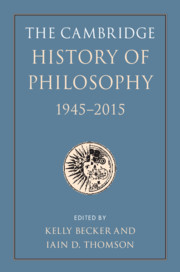Book contents
- The Cambridge History of Philosophy, 1945–2015
- The Cambridge History of Philosophy, 1945–2015
- Copyright page
- Contents
- Contributors
- Preface and Acknowledgments
- Introduction
- Part I Analytic Philosophy
- Part II Continental Philosophy
- Section Five Central Movements and Issues
- Section Six Continental Moral, Social, and Political Philosophy
- 33 The Concept of Autonomy in the History of the Frankfurt School
- 34 Emerging Ethics
- 35 Leo Strauss: Political Philosophy as First Philosophy
- 36 Critical Environmental Philosophy
- 37 Philosophy of Technology
- 38 Philosophy of Education and the “Education of Reason”
- Section Seven Continental Aesthetics and Philosophy of Religion
- Part III Bridge Builders, Border Crossers, Synthesizers, and Comparative Philosophy
- Part IV Epilogue: On the Philosophy of the History of Philosophy
- References
- Index
38 - Philosophy of Education and the “Education of Reason”
Post-Foundational Approaches through Dewey, Wittgenstein, and Foucault
from Section Six - Continental Moral, Social, and Political Philosophy
Published online by Cambridge University Press: 08 November 2019
- The Cambridge History of Philosophy, 1945–2015
- The Cambridge History of Philosophy, 1945–2015
- Copyright page
- Contents
- Contributors
- Preface and Acknowledgments
- Introduction
- Part I Analytic Philosophy
- Part II Continental Philosophy
- Section Five Central Movements and Issues
- Section Six Continental Moral, Social, and Political Philosophy
- 33 The Concept of Autonomy in the History of the Frankfurt School
- 34 Emerging Ethics
- 35 Leo Strauss: Political Philosophy as First Philosophy
- 36 Critical Environmental Philosophy
- 37 Philosophy of Technology
- 38 Philosophy of Education and the “Education of Reason”
- Section Seven Continental Aesthetics and Philosophy of Religion
- Part III Bridge Builders, Border Crossers, Synthesizers, and Comparative Philosophy
- Part IV Epilogue: On the Philosophy of the History of Philosophy
- References
- Index
Summary
In the post-war era, Philosophy of Education (hereafter “PoE”) underwent a search for its identity and credentials, responding – like most fields in the humanities – to the challenges of logical positivism and attendant demands for scientific rigor and verification of truth claims. At the risk of omitting or typecasting colleagues, a panoramic sweep reveals PoE’s affiliations and rivalries between several concurrent movements of late twentieth-century thought: Anglo liberal-analytic philosophy championed by Oakeshott’s (1989) defense of the liberal arts over vocational education, with R. S. Peters’s (1965) and Hirst’s (1965) emphasis on conceptual analyses that drew (often incorrectly) on Wittgenstein, Ryle, and Austin; moral philosophy and citizenship education, with secular forms rooted in Rawls’s liberal Theory of Justice (1971), Kohlberg’s (1984) Kantian and Piagetian stage-theory (Boyd 2004), and Gilligan’s care ethic (Noddings 1984); opposition to communitarianism (Feinberg 1995) and Macintyre’s return to Aristotle and character development (Carr 2006; 2008; Kristjánsson 2006); the rich legacy of Dewey’s pragmatism and the Progressive movement in American education (Scheffler 1978; Bredo 1989; Stengel 2009) gracefully partnered by Emerson (Saito 2006); the Frankfurt School and its Hegelian and Marxian-Gramscian progeny (Bowles and Gintis 1979) in Critical Theory (McLaren 2000; 2007; Giroux 2003; Apple 2004a; 2004b; Thayer-Bacon 2006) with Bakhtin (Sidorkin 1999a; 1999b), Freire (1970; 1998), bell hooks (1994), and Vygotsky (Bakhurst 1991; Popkewitz 1999a); Heideggerian phenomenology (Vandenberg 1971) and ontological education (Thomson 2002; 2004; Peters 2002), with Levinasian respect for Otherness (Standish 1992; 2002; 2012); Wittgenstein’s reintroduction as a “pedagogical philosopher” (Marshall and Smeyers 1995; Peters and Marshall 1999; Peters, Burbules and Smeyers 2008/2010), as an elementary and Cambridge educator (Savickey 1999; Stickney 2005; cf. Medina 2002), as a Cartesian rationalist (Luntley 2003; 2007; 2008), as refiguring the child (Maruyama 1998; Peters 2001), as a therapeutic philosopher (Smeyers, Smith, and Standish 2007) distinguishing what can be meaningfully said (Smeyers 1993; Smith and Burbules 2005), and as Cavell (1979) powerfully reads Wittgenstein’s many “scenes of instruction” through Heidegger, Emerson, and Thoreau (Standish 2008; 2012); Nietzschean revaluations (Marshall, Smeyers, and Peters 2001) and French neo-Nietzschean postmodernism or post-structuralism, drawing on Foucault (Marshall 1985; Ball 1990; 2006; Fendler 1998; 2010; Popkewitz 1998; Olssen 2006; Peters 2007); Derrida (Trifonas 2000; Trifonas and Peters 2004), Lyotard (Peters 1995; Burbules 2000), Bourdieu (et al., 1965), Baudrillard (Norris 2006), and Rancière (1991; Biesta 2010; Masschelein and Simons 2011); overtures to cosmopolitanism (Papastephanou 2005; Todd 2009; Hansen 2010); critiques of racial and social justice (Williams 1992; Applebaum 2003) and feminism and Queer Theory with eclectic, emancipatory appropriations of Continental thinkers (Gore 1992; Fendler 1998; Boler 1999; Ruitenberg 2010; Mayo 2011) and reinterpretations of the male-centric canon (Martin 1985).
- Type
- Chapter
- Information
- The Cambridge History of Philosophy, 1945–2015 , pp. 513 - 526Publisher: Cambridge University PressPrint publication year: 2019
- 3
- Cited by



